Taxation Law: Analysis of Income with Arthur Murray & RIP Pty Ltd
VerifiedAdded on 2023/06/11
|13
|3351
|415
Report
AI Summary
This report delves into taxation law, primarily focusing on the analysis of the Arthur Murray (NSW) Pty Ltd V FCT case and RIP Pty Ltd's income assessment. It examines the treatment of prepaid fees and forfeited payments, referencing relevant sections of the Income Tax Assessment Act 1997. The analysis covers the court's decision in the Arthur Murray case, highlighting the distinction between derived income and prepaid fees. Furthermore, it discusses the application of receipt and earning methods for calculating taxable income, providing a detailed overview of how RIP Pty Ltd should handle advanced fees under its easy future plan. The document concludes by addressing the treatment of trading stock and deductible expenses for RIP Pty Ltd, offering a comprehensive insight into the taxation implications for businesses.
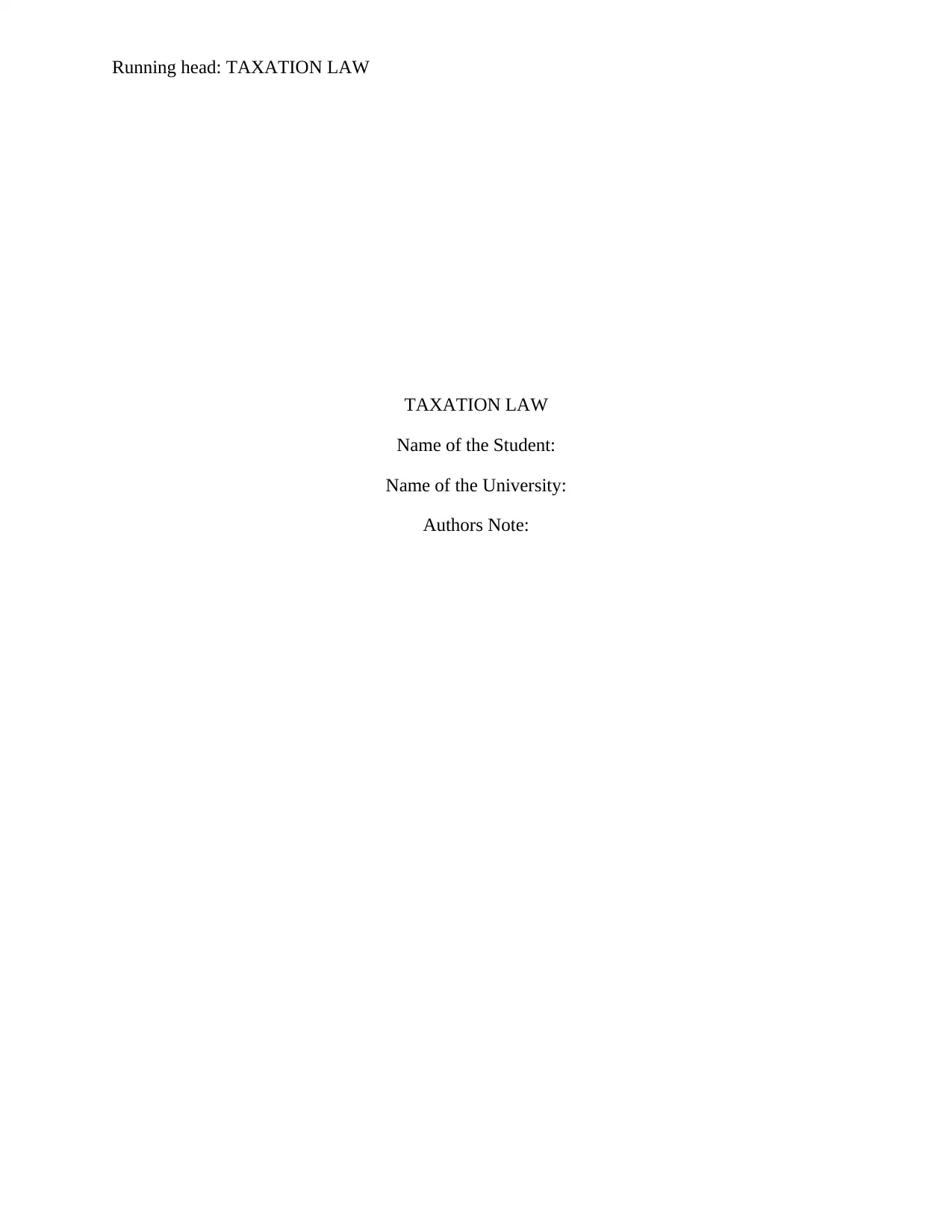
Running head: TAXATION LAW
TAXATION LAW
Name of the Student:
Name of the University:
Authors Note:
TAXATION LAW
Name of the Student:
Name of the University:
Authors Note:
Paraphrase This Document
Need a fresh take? Get an instant paraphrase of this document with our AI Paraphraser
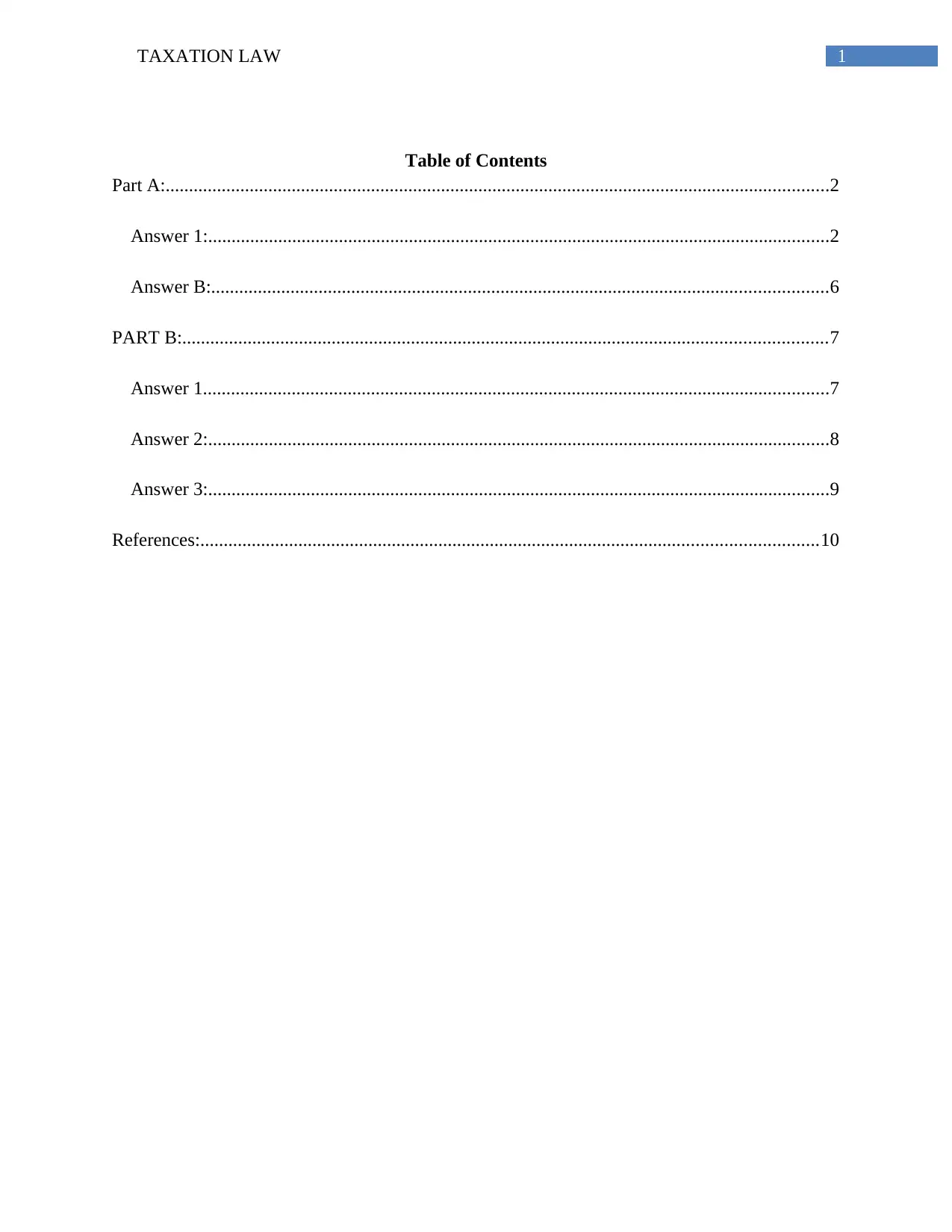
1TAXATION LAW
Table of Contents
Part A:..............................................................................................................................................2
Answer 1:.....................................................................................................................................2
Answer B:....................................................................................................................................6
PART B:..........................................................................................................................................7
Answer 1......................................................................................................................................7
Answer 2:.....................................................................................................................................8
Answer 3:.....................................................................................................................................9
References:....................................................................................................................................10
Table of Contents
Part A:..............................................................................................................................................2
Answer 1:.....................................................................................................................................2
Answer B:....................................................................................................................................6
PART B:..........................................................................................................................................7
Answer 1......................................................................................................................................7
Answer 2:.....................................................................................................................................8
Answer 3:.....................................................................................................................................9
References:....................................................................................................................................10
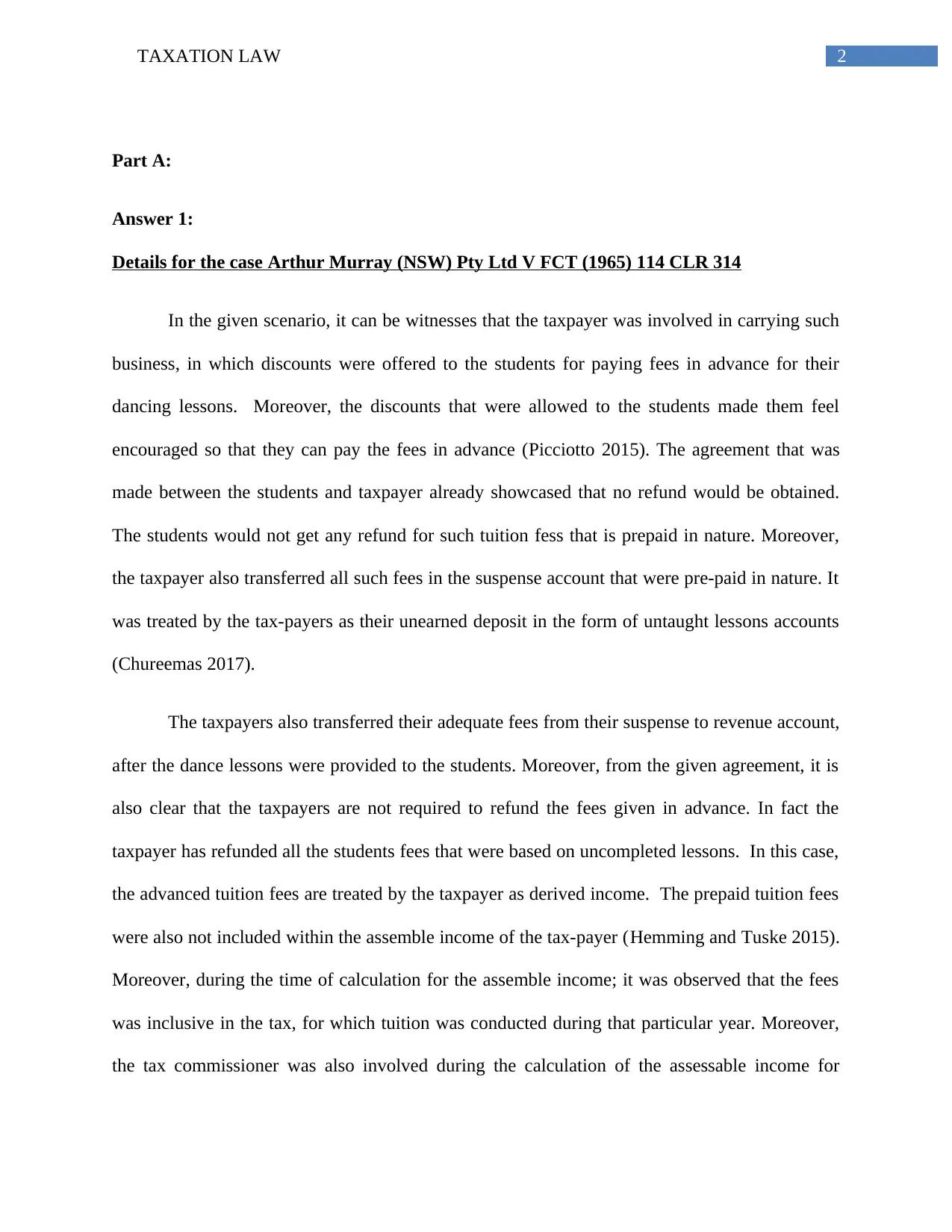
2TAXATION LAW
Part A:
Answer 1:
Details for the case Arthur Murray (NSW) Pty Ltd V FCT (1965) 114 CLR 314
In the given scenario, it can be witnesses that the taxpayer was involved in carrying such
business, in which discounts were offered to the students for paying fees in advance for their
dancing lessons. Moreover, the discounts that were allowed to the students made them feel
encouraged so that they can pay the fees in advance (Picciotto 2015). The agreement that was
made between the students and taxpayer already showcased that no refund would be obtained.
The students would not get any refund for such tuition fess that is prepaid in nature. Moreover,
the taxpayer also transferred all such fees in the suspense account that were pre-paid in nature. It
was treated by the tax-payers as their unearned deposit in the form of untaught lessons accounts
(Chureemas 2017).
The taxpayers also transferred their adequate fees from their suspense to revenue account,
after the dance lessons were provided to the students. Moreover, from the given agreement, it is
also clear that the taxpayers are not required to refund the fees given in advance. In fact the
taxpayer has refunded all the students fees that were based on uncompleted lessons. In this case,
the advanced tuition fees are treated by the taxpayer as derived income. The prepaid tuition fees
were also not included within the assemble income of the tax-payer (Hemming and Tuske 2015).
Moreover, during the time of calculation for the assemble income; it was observed that the fees
was inclusive in the tax, for which tuition was conducted during that particular year. Moreover,
the tax commissioner was also involved during the calculation of the assessable income for
Part A:
Answer 1:
Details for the case Arthur Murray (NSW) Pty Ltd V FCT (1965) 114 CLR 314
In the given scenario, it can be witnesses that the taxpayer was involved in carrying such
business, in which discounts were offered to the students for paying fees in advance for their
dancing lessons. Moreover, the discounts that were allowed to the students made them feel
encouraged so that they can pay the fees in advance (Picciotto 2015). The agreement that was
made between the students and taxpayer already showcased that no refund would be obtained.
The students would not get any refund for such tuition fess that is prepaid in nature. Moreover,
the taxpayer also transferred all such fees in the suspense account that were pre-paid in nature. It
was treated by the tax-payers as their unearned deposit in the form of untaught lessons accounts
(Chureemas 2017).
The taxpayers also transferred their adequate fees from their suspense to revenue account,
after the dance lessons were provided to the students. Moreover, from the given agreement, it is
also clear that the taxpayers are not required to refund the fees given in advance. In fact the
taxpayer has refunded all the students fees that were based on uncompleted lessons. In this case,
the advanced tuition fees are treated by the taxpayer as derived income. The prepaid tuition fees
were also not included within the assemble income of the tax-payer (Hemming and Tuske 2015).
Moreover, during the time of calculation for the assemble income; it was observed that the fees
was inclusive in the tax, for which tuition was conducted during that particular year. Moreover,
the tax commissioner was also involved during the calculation of the assessable income for
⊘ This is a preview!⊘
Do you want full access?
Subscribe today to unlock all pages.

Trusted by 1+ million students worldwide
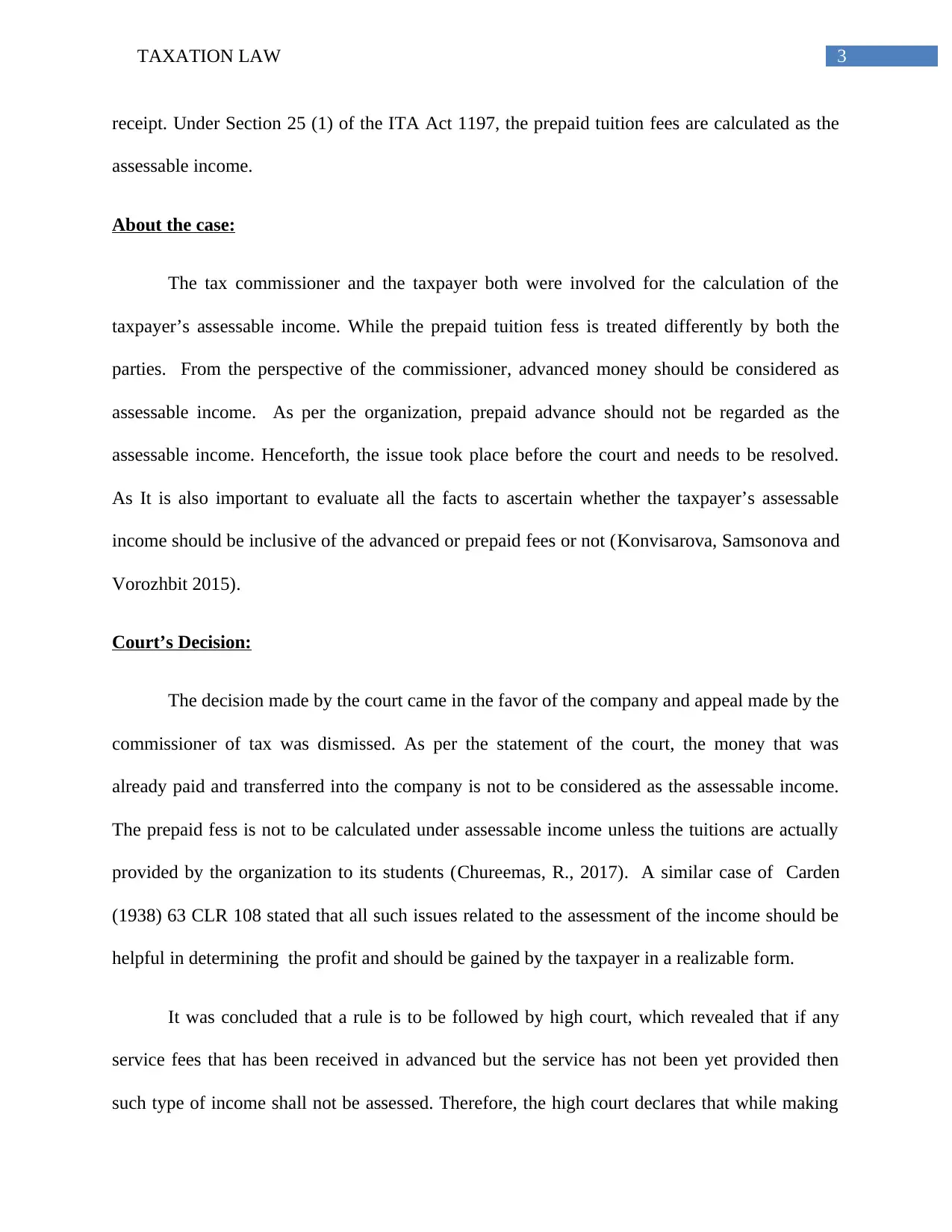
3TAXATION LAW
receipt. Under Section 25 (1) of the ITA Act 1197, the prepaid tuition fees are calculated as the
assessable income.
About the case:
The tax commissioner and the taxpayer both were involved for the calculation of the
taxpayer’s assessable income. While the prepaid tuition fess is treated differently by both the
parties. From the perspective of the commissioner, advanced money should be considered as
assessable income. As per the organization, prepaid advance should not be regarded as the
assessable income. Henceforth, the issue took place before the court and needs to be resolved.
As It is also important to evaluate all the facts to ascertain whether the taxpayer’s assessable
income should be inclusive of the advanced or prepaid fees or not (Konvisarova, Samsonova and
Vorozhbit 2015).
Court’s Decision:
The decision made by the court came in the favor of the company and appeal made by the
commissioner of tax was dismissed. As per the statement of the court, the money that was
already paid and transferred into the company is not to be considered as the assessable income.
The prepaid fess is not to be calculated under assessable income unless the tuitions are actually
provided by the organization to its students (Chureemas, R., 2017). A similar case of Carden
(1938) 63 CLR 108 stated that all such issues related to the assessment of the income should be
helpful in determining the profit and should be gained by the taxpayer in a realizable form.
It was concluded that a rule is to be followed by high court, which revealed that if any
service fees that has been received in advanced but the service has not been yet provided then
such type of income shall not be assessed. Therefore, the high court declares that while making
receipt. Under Section 25 (1) of the ITA Act 1197, the prepaid tuition fees are calculated as the
assessable income.
About the case:
The tax commissioner and the taxpayer both were involved for the calculation of the
taxpayer’s assessable income. While the prepaid tuition fess is treated differently by both the
parties. From the perspective of the commissioner, advanced money should be considered as
assessable income. As per the organization, prepaid advance should not be regarded as the
assessable income. Henceforth, the issue took place before the court and needs to be resolved.
As It is also important to evaluate all the facts to ascertain whether the taxpayer’s assessable
income should be inclusive of the advanced or prepaid fees or not (Konvisarova, Samsonova and
Vorozhbit 2015).
Court’s Decision:
The decision made by the court came in the favor of the company and appeal made by the
commissioner of tax was dismissed. As per the statement of the court, the money that was
already paid and transferred into the company is not to be considered as the assessable income.
The prepaid fess is not to be calculated under assessable income unless the tuitions are actually
provided by the organization to its students (Chureemas, R., 2017). A similar case of Carden
(1938) 63 CLR 108 stated that all such issues related to the assessment of the income should be
helpful in determining the profit and should be gained by the taxpayer in a realizable form.
It was concluded that a rule is to be followed by high court, which revealed that if any
service fees that has been received in advanced but the service has not been yet provided then
such type of income shall not be assessed. Therefore, the high court declares that while making
Paraphrase This Document
Need a fresh take? Get an instant paraphrase of this document with our AI Paraphraser
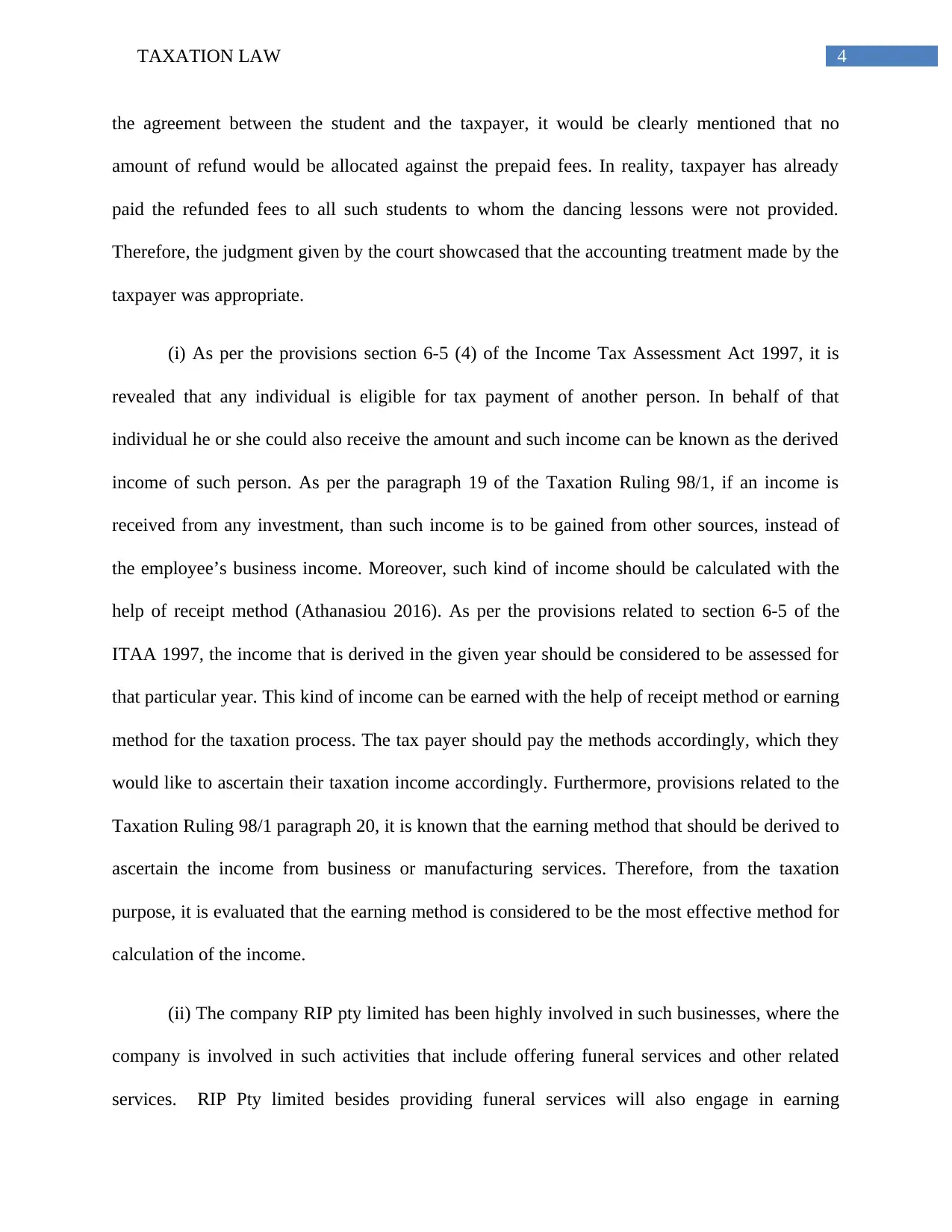
4TAXATION LAW
the agreement between the student and the taxpayer, it would be clearly mentioned that no
amount of refund would be allocated against the prepaid fees. In reality, taxpayer has already
paid the refunded fees to all such students to whom the dancing lessons were not provided.
Therefore, the judgment given by the court showcased that the accounting treatment made by the
taxpayer was appropriate.
(i) As per the provisions section 6-5 (4) of the Income Tax Assessment Act 1997, it is
revealed that any individual is eligible for tax payment of another person. In behalf of that
individual he or she could also receive the amount and such income can be known as the derived
income of such person. As per the paragraph 19 of the Taxation Ruling 98/1, if an income is
received from any investment, than such income is to be gained from other sources, instead of
the employee’s business income. Moreover, such kind of income should be calculated with the
help of receipt method (Athanasiou 2016). As per the provisions related to section 6-5 of the
ITAA 1997, the income that is derived in the given year should be considered to be assessed for
that particular year. This kind of income can be earned with the help of receipt method or earning
method for the taxation process. The tax payer should pay the methods accordingly, which they
would like to ascertain their taxation income accordingly. Furthermore, provisions related to the
Taxation Ruling 98/1 paragraph 20, it is known that the earning method that should be derived to
ascertain the income from business or manufacturing services. Therefore, from the taxation
purpose, it is evaluated that the earning method is considered to be the most effective method for
calculation of the income.
(ii) The company RIP pty limited has been highly involved in such businesses, where the
company is involved in such activities that include offering funeral services and other related
services. RIP Pty limited besides providing funeral services will also engage in earning
the agreement between the student and the taxpayer, it would be clearly mentioned that no
amount of refund would be allocated against the prepaid fees. In reality, taxpayer has already
paid the refunded fees to all such students to whom the dancing lessons were not provided.
Therefore, the judgment given by the court showcased that the accounting treatment made by the
taxpayer was appropriate.
(i) As per the provisions section 6-5 (4) of the Income Tax Assessment Act 1997, it is
revealed that any individual is eligible for tax payment of another person. In behalf of that
individual he or she could also receive the amount and such income can be known as the derived
income of such person. As per the paragraph 19 of the Taxation Ruling 98/1, if an income is
received from any investment, than such income is to be gained from other sources, instead of
the employee’s business income. Moreover, such kind of income should be calculated with the
help of receipt method (Athanasiou 2016). As per the provisions related to section 6-5 of the
ITAA 1997, the income that is derived in the given year should be considered to be assessed for
that particular year. This kind of income can be earned with the help of receipt method or earning
method for the taxation process. The tax payer should pay the methods accordingly, which they
would like to ascertain their taxation income accordingly. Furthermore, provisions related to the
Taxation Ruling 98/1 paragraph 20, it is known that the earning method that should be derived to
ascertain the income from business or manufacturing services. Therefore, from the taxation
purpose, it is evaluated that the earning method is considered to be the most effective method for
calculation of the income.
(ii) The company RIP pty limited has been highly involved in such businesses, where the
company is involved in such activities that include offering funeral services and other related
services. RIP Pty limited besides providing funeral services will also engage in earning
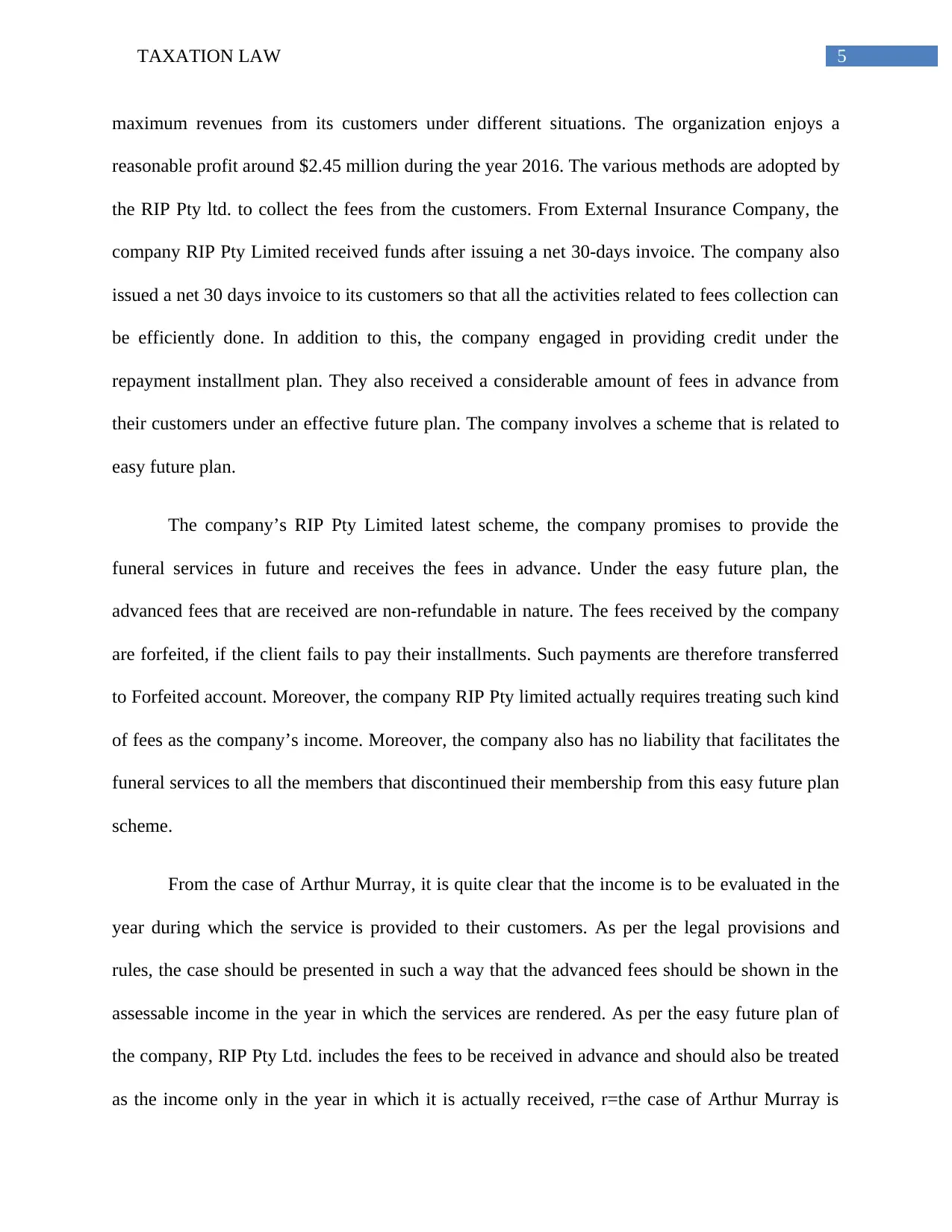
5TAXATION LAW
maximum revenues from its customers under different situations. The organization enjoys a
reasonable profit around $2.45 million during the year 2016. The various methods are adopted by
the RIP Pty ltd. to collect the fees from the customers. From External Insurance Company, the
company RIP Pty Limited received funds after issuing a net 30-days invoice. The company also
issued a net 30 days invoice to its customers so that all the activities related to fees collection can
be efficiently done. In addition to this, the company engaged in providing credit under the
repayment installment plan. They also received a considerable amount of fees in advance from
their customers under an effective future plan. The company involves a scheme that is related to
easy future plan.
The company’s RIP Pty Limited latest scheme, the company promises to provide the
funeral services in future and receives the fees in advance. Under the easy future plan, the
advanced fees that are received are non-refundable in nature. The fees received by the company
are forfeited, if the client fails to pay their installments. Such payments are therefore transferred
to Forfeited account. Moreover, the company RIP Pty limited actually requires treating such kind
of fees as the company’s income. Moreover, the company also has no liability that facilitates the
funeral services to all the members that discontinued their membership from this easy future plan
scheme.
From the case of Arthur Murray, it is quite clear that the income is to be evaluated in the
year during which the service is provided to their customers. As per the legal provisions and
rules, the case should be presented in such a way that the advanced fees should be shown in the
assessable income in the year in which the services are rendered. As per the easy future plan of
the company, RIP Pty Ltd. includes the fees to be received in advance and should also be treated
as the income only in the year in which it is actually received, r=the case of Arthur Murray is
maximum revenues from its customers under different situations. The organization enjoys a
reasonable profit around $2.45 million during the year 2016. The various methods are adopted by
the RIP Pty ltd. to collect the fees from the customers. From External Insurance Company, the
company RIP Pty Limited received funds after issuing a net 30-days invoice. The company also
issued a net 30 days invoice to its customers so that all the activities related to fees collection can
be efficiently done. In addition to this, the company engaged in providing credit under the
repayment installment plan. They also received a considerable amount of fees in advance from
their customers under an effective future plan. The company involves a scheme that is related to
easy future plan.
The company’s RIP Pty Limited latest scheme, the company promises to provide the
funeral services in future and receives the fees in advance. Under the easy future plan, the
advanced fees that are received are non-refundable in nature. The fees received by the company
are forfeited, if the client fails to pay their installments. Such payments are therefore transferred
to Forfeited account. Moreover, the company RIP Pty limited actually requires treating such kind
of fees as the company’s income. Moreover, the company also has no liability that facilitates the
funeral services to all the members that discontinued their membership from this easy future plan
scheme.
From the case of Arthur Murray, it is quite clear that the income is to be evaluated in the
year during which the service is provided to their customers. As per the legal provisions and
rules, the case should be presented in such a way that the advanced fees should be shown in the
assessable income in the year in which the services are rendered. As per the easy future plan of
the company, RIP Pty Ltd. includes the fees to be received in advance and should also be treated
as the income only in the year in which it is actually received, r=the case of Arthur Murray is
⊘ This is a preview!⊘
Do you want full access?
Subscribe today to unlock all pages.

Trusted by 1+ million students worldwide
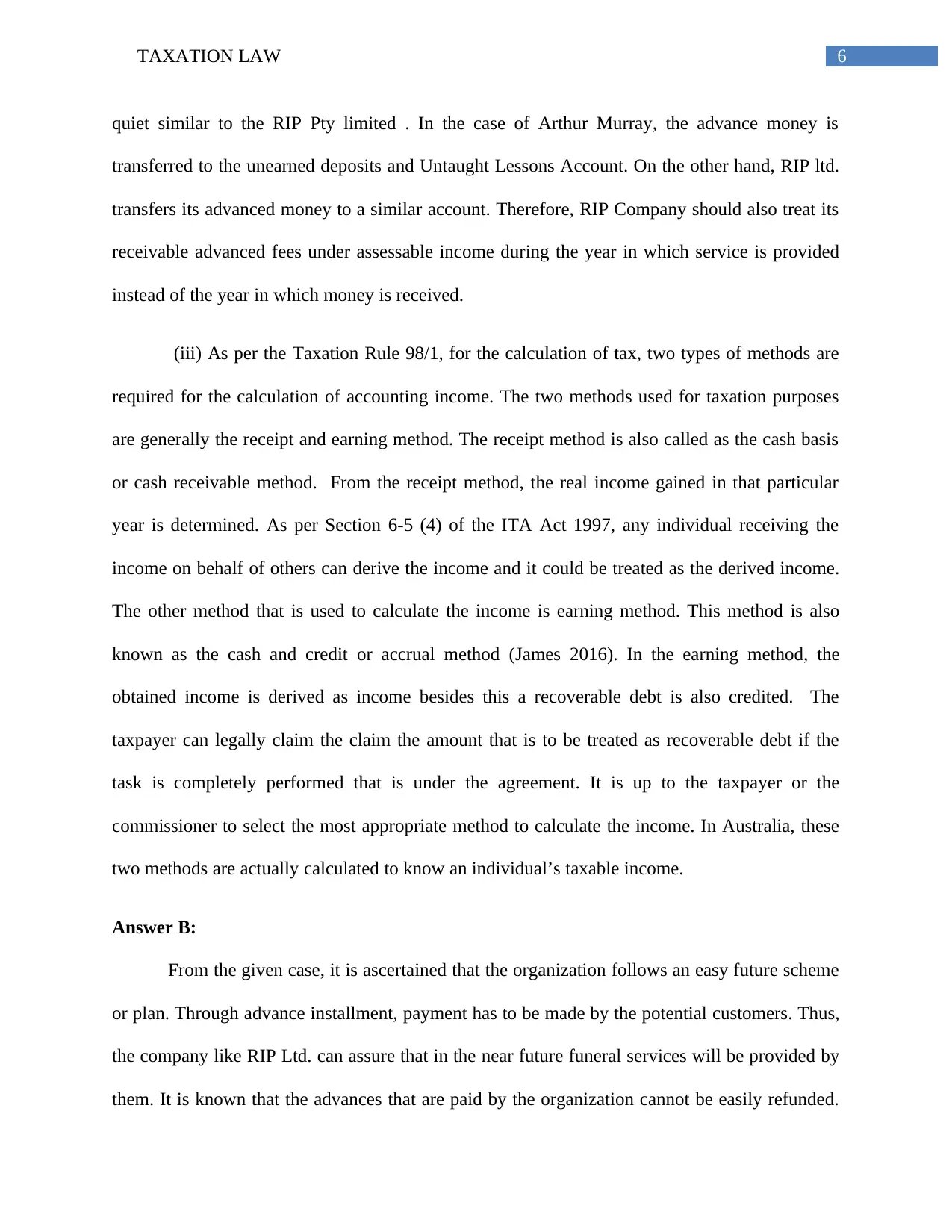
6TAXATION LAW
quiet similar to the RIP Pty limited . In the case of Arthur Murray, the advance money is
transferred to the unearned deposits and Untaught Lessons Account. On the other hand, RIP ltd.
transfers its advanced money to a similar account. Therefore, RIP Company should also treat its
receivable advanced fees under assessable income during the year in which service is provided
instead of the year in which money is received.
(iii) As per the Taxation Rule 98/1, for the calculation of tax, two types of methods are
required for the calculation of accounting income. The two methods used for taxation purposes
are generally the receipt and earning method. The receipt method is also called as the cash basis
or cash receivable method. From the receipt method, the real income gained in that particular
year is determined. As per Section 6-5 (4) of the ITA Act 1997, any individual receiving the
income on behalf of others can derive the income and it could be treated as the derived income.
The other method that is used to calculate the income is earning method. This method is also
known as the cash and credit or accrual method (James 2016). In the earning method, the
obtained income is derived as income besides this a recoverable debt is also credited. The
taxpayer can legally claim the claim the amount that is to be treated as recoverable debt if the
task is completely performed that is under the agreement. It is up to the taxpayer or the
commissioner to select the most appropriate method to calculate the income. In Australia, these
two methods are actually calculated to know an individual’s taxable income.
Answer B:
From the given case, it is ascertained that the organization follows an easy future scheme
or plan. Through advance installment, payment has to be made by the potential customers. Thus,
the company like RIP Ltd. can assure that in the near future funeral services will be provided by
them. It is known that the advances that are paid by the organization cannot be easily refunded.
quiet similar to the RIP Pty limited . In the case of Arthur Murray, the advance money is
transferred to the unearned deposits and Untaught Lessons Account. On the other hand, RIP ltd.
transfers its advanced money to a similar account. Therefore, RIP Company should also treat its
receivable advanced fees under assessable income during the year in which service is provided
instead of the year in which money is received.
(iii) As per the Taxation Rule 98/1, for the calculation of tax, two types of methods are
required for the calculation of accounting income. The two methods used for taxation purposes
are generally the receipt and earning method. The receipt method is also called as the cash basis
or cash receivable method. From the receipt method, the real income gained in that particular
year is determined. As per Section 6-5 (4) of the ITA Act 1997, any individual receiving the
income on behalf of others can derive the income and it could be treated as the derived income.
The other method that is used to calculate the income is earning method. This method is also
known as the cash and credit or accrual method (James 2016). In the earning method, the
obtained income is derived as income besides this a recoverable debt is also credited. The
taxpayer can legally claim the claim the amount that is to be treated as recoverable debt if the
task is completely performed that is under the agreement. It is up to the taxpayer or the
commissioner to select the most appropriate method to calculate the income. In Australia, these
two methods are actually calculated to know an individual’s taxable income.
Answer B:
From the given case, it is ascertained that the organization follows an easy future scheme
or plan. Through advance installment, payment has to be made by the potential customers. Thus,
the company like RIP Ltd. can assure that in the near future funeral services will be provided by
them. It is known that the advances that are paid by the organization cannot be easily refunded.
Paraphrase This Document
Need a fresh take? Get an instant paraphrase of this document with our AI Paraphraser
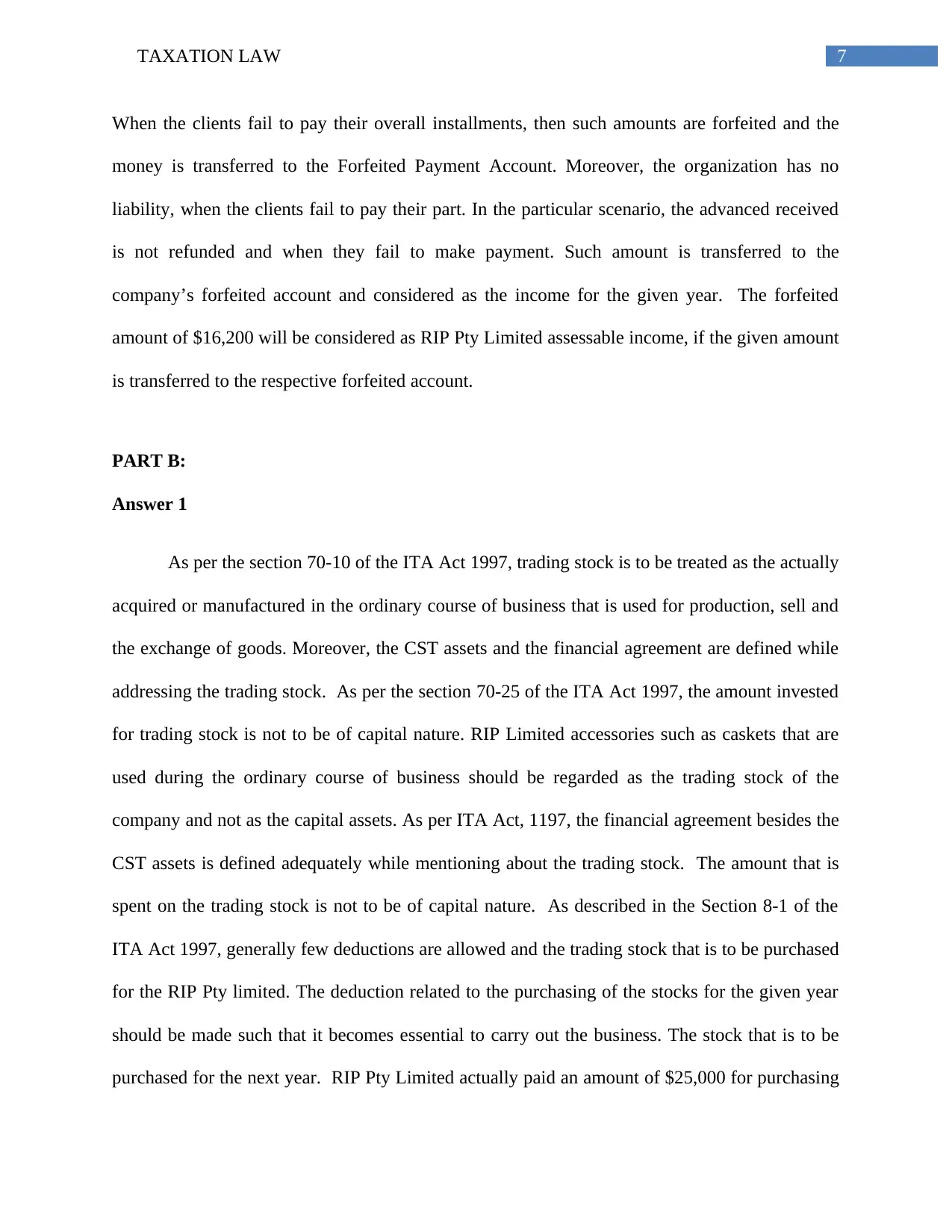
7TAXATION LAW
When the clients fail to pay their overall installments, then such amounts are forfeited and the
money is transferred to the Forfeited Payment Account. Moreover, the organization has no
liability, when the clients fail to pay their part. In the particular scenario, the advanced received
is not refunded and when they fail to make payment. Such amount is transferred to the
company’s forfeited account and considered as the income for the given year. The forfeited
amount of $16,200 will be considered as RIP Pty Limited assessable income, if the given amount
is transferred to the respective forfeited account.
PART B:
Answer 1
As per the section 70-10 of the ITA Act 1997, trading stock is to be treated as the actually
acquired or manufactured in the ordinary course of business that is used for production, sell and
the exchange of goods. Moreover, the CST assets and the financial agreement are defined while
addressing the trading stock. As per the section 70-25 of the ITA Act 1997, the amount invested
for trading stock is not to be of capital nature. RIP Limited accessories such as caskets that are
used during the ordinary course of business should be regarded as the trading stock of the
company and not as the capital assets. As per ITA Act, 1197, the financial agreement besides the
CST assets is defined adequately while mentioning about the trading stock. The amount that is
spent on the trading stock is not to be of capital nature. As described in the Section 8-1 of the
ITA Act 1997, generally few deductions are allowed and the trading stock that is to be purchased
for the RIP Pty limited. The deduction related to the purchasing of the stocks for the given year
should be made such that it becomes essential to carry out the business. The stock that is to be
purchased for the next year. RIP Pty Limited actually paid an amount of $25,000 for purchasing
When the clients fail to pay their overall installments, then such amounts are forfeited and the
money is transferred to the Forfeited Payment Account. Moreover, the organization has no
liability, when the clients fail to pay their part. In the particular scenario, the advanced received
is not refunded and when they fail to make payment. Such amount is transferred to the
company’s forfeited account and considered as the income for the given year. The forfeited
amount of $16,200 will be considered as RIP Pty Limited assessable income, if the given amount
is transferred to the respective forfeited account.
PART B:
Answer 1
As per the section 70-10 of the ITA Act 1997, trading stock is to be treated as the actually
acquired or manufactured in the ordinary course of business that is used for production, sell and
the exchange of goods. Moreover, the CST assets and the financial agreement are defined while
addressing the trading stock. As per the section 70-25 of the ITA Act 1997, the amount invested
for trading stock is not to be of capital nature. RIP Limited accessories such as caskets that are
used during the ordinary course of business should be regarded as the trading stock of the
company and not as the capital assets. As per ITA Act, 1197, the financial agreement besides the
CST assets is defined adequately while mentioning about the trading stock. The amount that is
spent on the trading stock is not to be of capital nature. As described in the Section 8-1 of the
ITA Act 1997, generally few deductions are allowed and the trading stock that is to be purchased
for the RIP Pty limited. The deduction related to the purchasing of the stocks for the given year
should be made such that it becomes essential to carry out the business. The stock that is to be
purchased for the next year. RIP Pty Limited actually paid an amount of $25,000 for purchasing
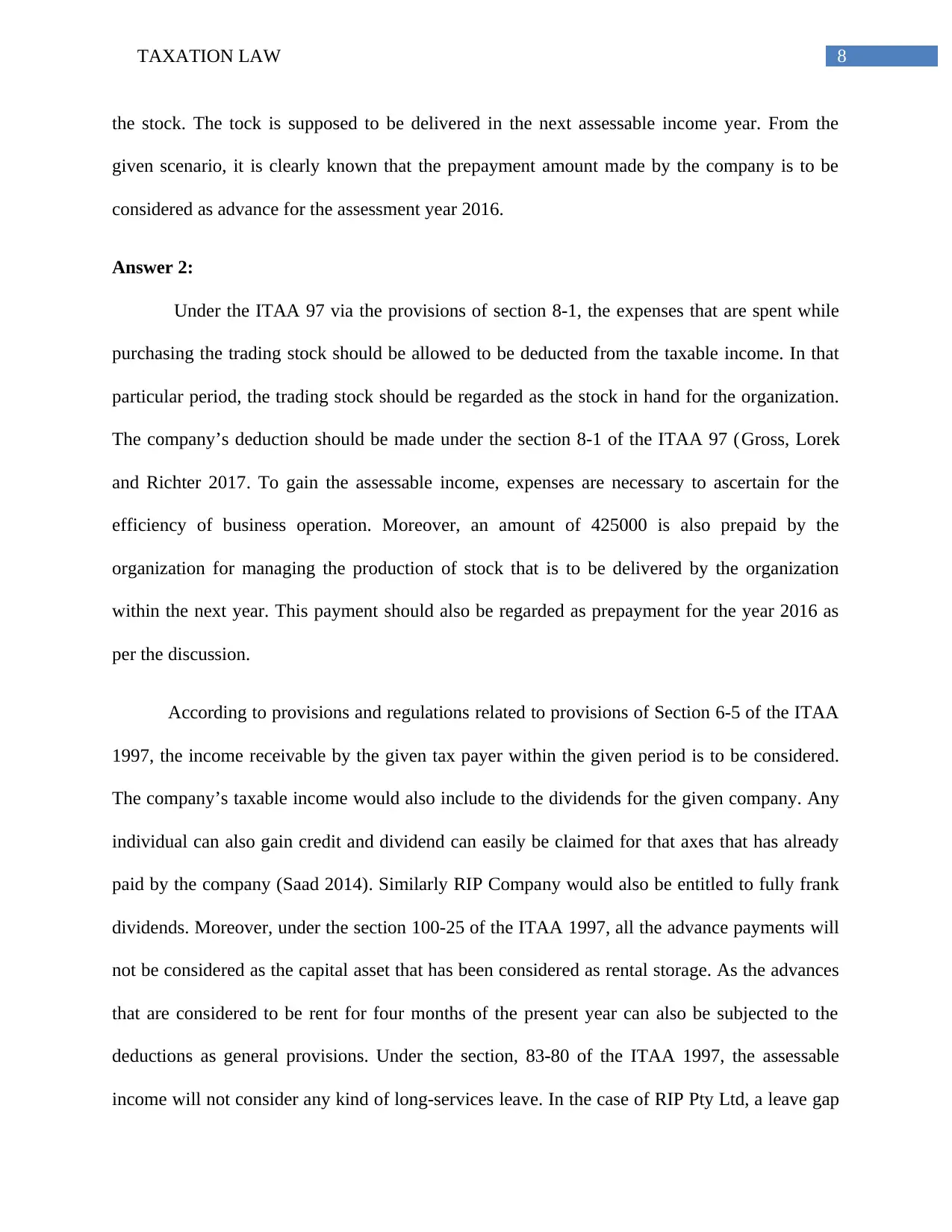
8TAXATION LAW
the stock. The tock is supposed to be delivered in the next assessable income year. From the
given scenario, it is clearly known that the prepayment amount made by the company is to be
considered as advance for the assessment year 2016.
Answer 2:
Under the ITAA 97 via the provisions of section 8-1, the expenses that are spent while
purchasing the trading stock should be allowed to be deducted from the taxable income. In that
particular period, the trading stock should be regarded as the stock in hand for the organization.
The company’s deduction should be made under the section 8-1 of the ITAA 97 (Gross, Lorek
and Richter 2017. To gain the assessable income, expenses are necessary to ascertain for the
efficiency of business operation. Moreover, an amount of 425000 is also prepaid by the
organization for managing the production of stock that is to be delivered by the organization
within the next year. This payment should also be regarded as prepayment for the year 2016 as
per the discussion.
According to provisions and regulations related to provisions of Section 6-5 of the ITAA
1997, the income receivable by the given tax payer within the given period is to be considered.
The company’s taxable income would also include to the dividends for the given company. Any
individual can also gain credit and dividend can easily be claimed for that axes that has already
paid by the company (Saad 2014). Similarly RIP Company would also be entitled to fully frank
dividends. Moreover, under the section 100-25 of the ITAA 1997, all the advance payments will
not be considered as the capital asset that has been considered as rental storage. As the advances
that are considered to be rent for four months of the present year can also be subjected to the
deductions as general provisions. Under the section, 83-80 of the ITAA 1997, the assessable
income will not consider any kind of long-services leave. In the case of RIP Pty Ltd, a leave gap
the stock. The tock is supposed to be delivered in the next assessable income year. From the
given scenario, it is clearly known that the prepayment amount made by the company is to be
considered as advance for the assessment year 2016.
Answer 2:
Under the ITAA 97 via the provisions of section 8-1, the expenses that are spent while
purchasing the trading stock should be allowed to be deducted from the taxable income. In that
particular period, the trading stock should be regarded as the stock in hand for the organization.
The company’s deduction should be made under the section 8-1 of the ITAA 97 (Gross, Lorek
and Richter 2017. To gain the assessable income, expenses are necessary to ascertain for the
efficiency of business operation. Moreover, an amount of 425000 is also prepaid by the
organization for managing the production of stock that is to be delivered by the organization
within the next year. This payment should also be regarded as prepayment for the year 2016 as
per the discussion.
According to provisions and regulations related to provisions of Section 6-5 of the ITAA
1997, the income receivable by the given tax payer within the given period is to be considered.
The company’s taxable income would also include to the dividends for the given company. Any
individual can also gain credit and dividend can easily be claimed for that axes that has already
paid by the company (Saad 2014). Similarly RIP Company would also be entitled to fully frank
dividends. Moreover, under the section 100-25 of the ITAA 1997, all the advance payments will
not be considered as the capital asset that has been considered as rental storage. As the advances
that are considered to be rent for four months of the present year can also be subjected to the
deductions as general provisions. Under the section, 83-80 of the ITAA 1997, the assessable
income will not consider any kind of long-services leave. In the case of RIP Pty Ltd, a leave gap
⊘ This is a preview!⊘
Do you want full access?
Subscribe today to unlock all pages.

Trusted by 1+ million students worldwide
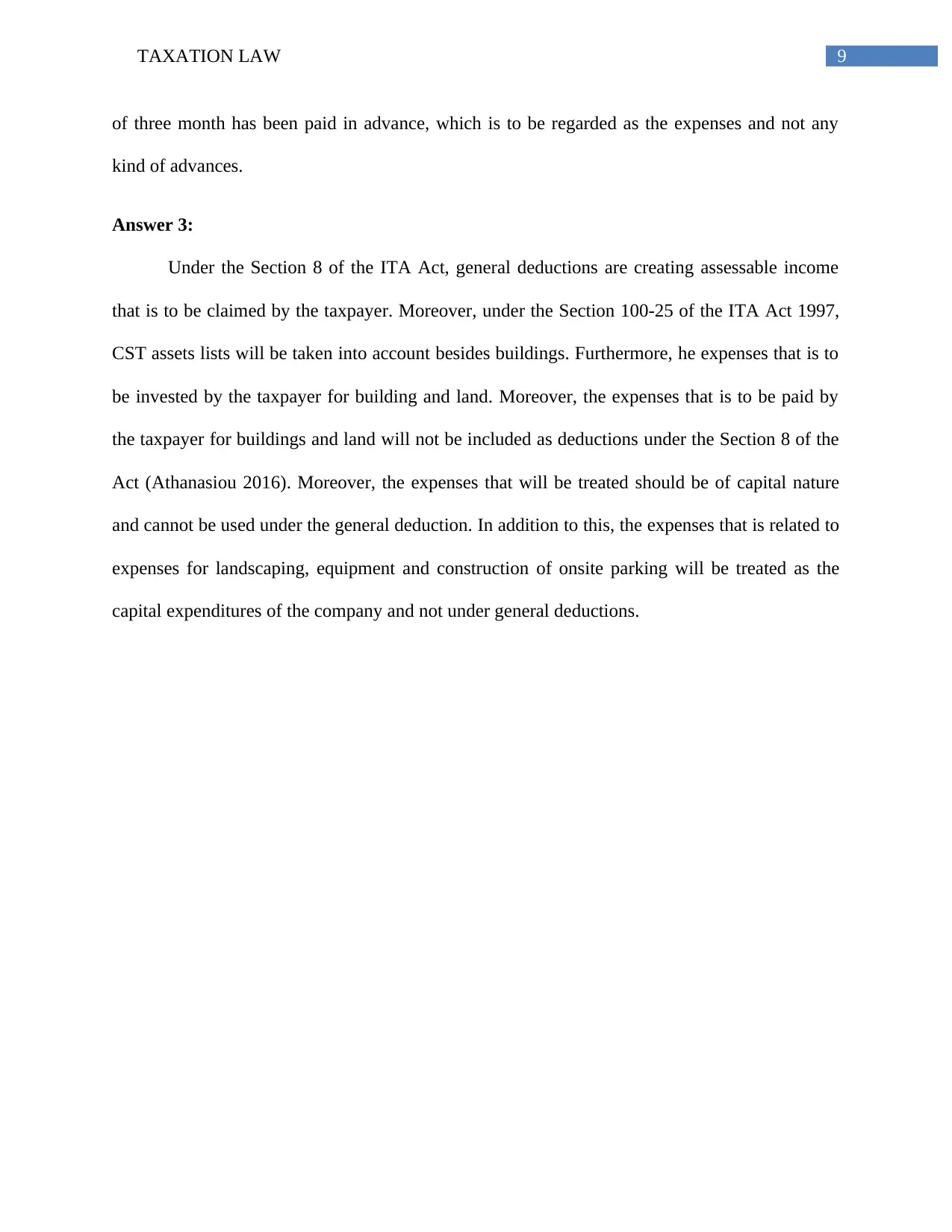
9TAXATION LAW
of three month has been paid in advance, which is to be regarded as the expenses and not any
kind of advances.
Answer 3:
Under the Section 8 of the ITA Act, general deductions are creating assessable income
that is to be claimed by the taxpayer. Moreover, under the Section 100-25 of the ITA Act 1997,
CST assets lists will be taken into account besides buildings. Furthermore, he expenses that is to
be invested by the taxpayer for building and land. Moreover, the expenses that is to be paid by
the taxpayer for buildings and land will not be included as deductions under the Section 8 of the
Act (Athanasiou 2016). Moreover, the expenses that will be treated should be of capital nature
and cannot be used under the general deduction. In addition to this, the expenses that is related to
expenses for landscaping, equipment and construction of onsite parking will be treated as the
capital expenditures of the company and not under general deductions.
of three month has been paid in advance, which is to be regarded as the expenses and not any
kind of advances.
Answer 3:
Under the Section 8 of the ITA Act, general deductions are creating assessable income
that is to be claimed by the taxpayer. Moreover, under the Section 100-25 of the ITA Act 1997,
CST assets lists will be taken into account besides buildings. Furthermore, he expenses that is to
be invested by the taxpayer for building and land. Moreover, the expenses that is to be paid by
the taxpayer for buildings and land will not be included as deductions under the Section 8 of the
Act (Athanasiou 2016). Moreover, the expenses that will be treated should be of capital nature
and cannot be used under the general deduction. In addition to this, the expenses that is related to
expenses for landscaping, equipment and construction of onsite parking will be treated as the
capital expenditures of the company and not under general deductions.
Paraphrase This Document
Need a fresh take? Get an instant paraphrase of this document with our AI Paraphraser
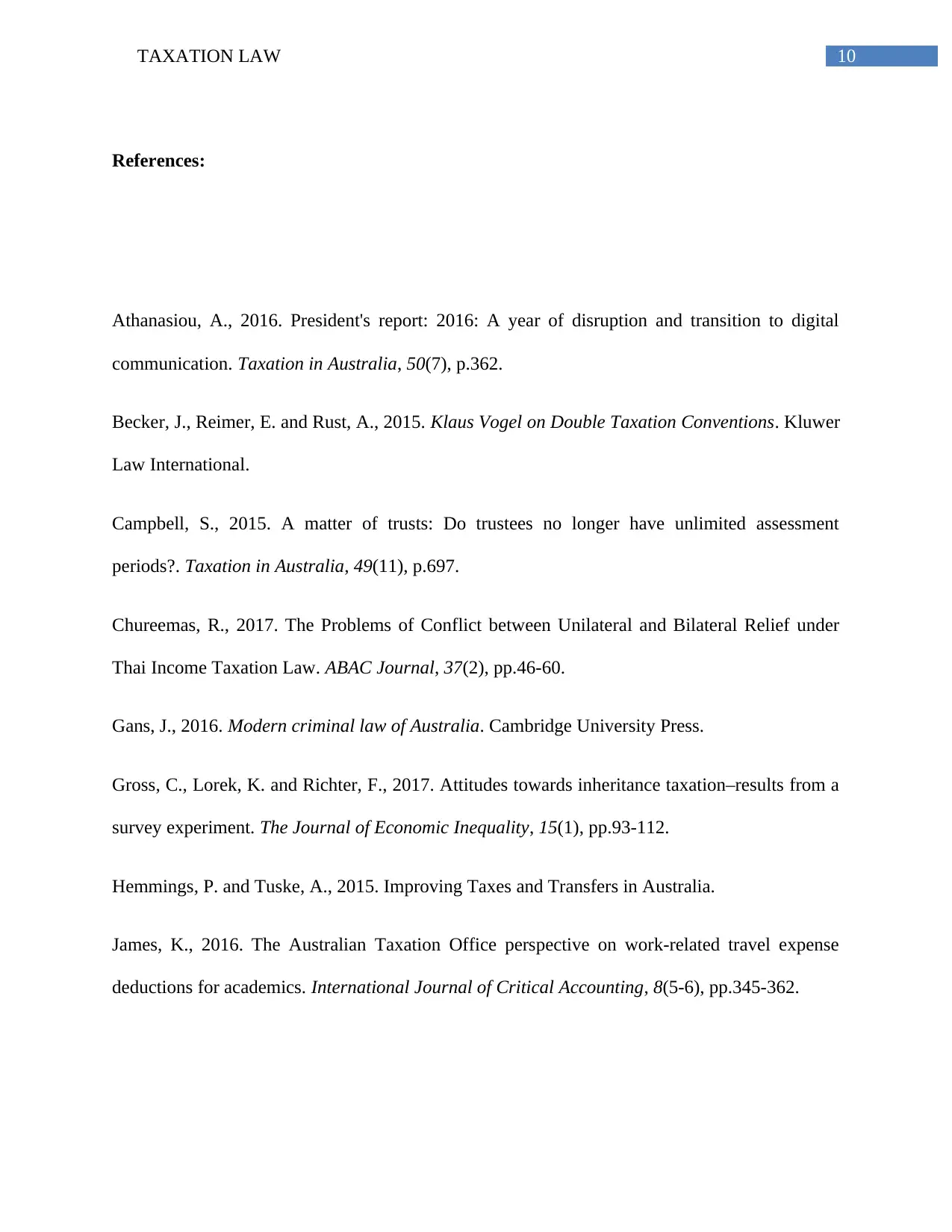
10TAXATION LAW
References:
Athanasiou, A., 2016. President's report: 2016: A year of disruption and transition to digital
communication. Taxation in Australia, 50(7), p.362.
Becker, J., Reimer, E. and Rust, A., 2015. Klaus Vogel on Double Taxation Conventions. Kluwer
Law International.
Campbell, S., 2015. A matter of trusts: Do trustees no longer have unlimited assessment
periods?. Taxation in Australia, 49(11), p.697.
Chureemas, R., 2017. The Problems of Conflict between Unilateral and Bilateral Relief under
Thai Income Taxation Law. ABAC Journal, 37(2), pp.46-60.
Gans, J., 2016. Modern criminal law of Australia. Cambridge University Press.
Gross, C., Lorek, K. and Richter, F., 2017. Attitudes towards inheritance taxation–results from a
survey experiment. The Journal of Economic Inequality, 15(1), pp.93-112.
Hemmings, P. and Tuske, A., 2015. Improving Taxes and Transfers in Australia.
James, K., 2016. The Australian Taxation Office perspective on work-related travel expense
deductions for academics. International Journal of Critical Accounting, 8(5-6), pp.345-362.
References:
Athanasiou, A., 2016. President's report: 2016: A year of disruption and transition to digital
communication. Taxation in Australia, 50(7), p.362.
Becker, J., Reimer, E. and Rust, A., 2015. Klaus Vogel on Double Taxation Conventions. Kluwer
Law International.
Campbell, S., 2015. A matter of trusts: Do trustees no longer have unlimited assessment
periods?. Taxation in Australia, 49(11), p.697.
Chureemas, R., 2017. The Problems of Conflict between Unilateral and Bilateral Relief under
Thai Income Taxation Law. ABAC Journal, 37(2), pp.46-60.
Gans, J., 2016. Modern criminal law of Australia. Cambridge University Press.
Gross, C., Lorek, K. and Richter, F., 2017. Attitudes towards inheritance taxation–results from a
survey experiment. The Journal of Economic Inequality, 15(1), pp.93-112.
Hemmings, P. and Tuske, A., 2015. Improving Taxes and Transfers in Australia.
James, K., 2016. The Australian Taxation Office perspective on work-related travel expense
deductions for academics. International Journal of Critical Accounting, 8(5-6), pp.345-362.
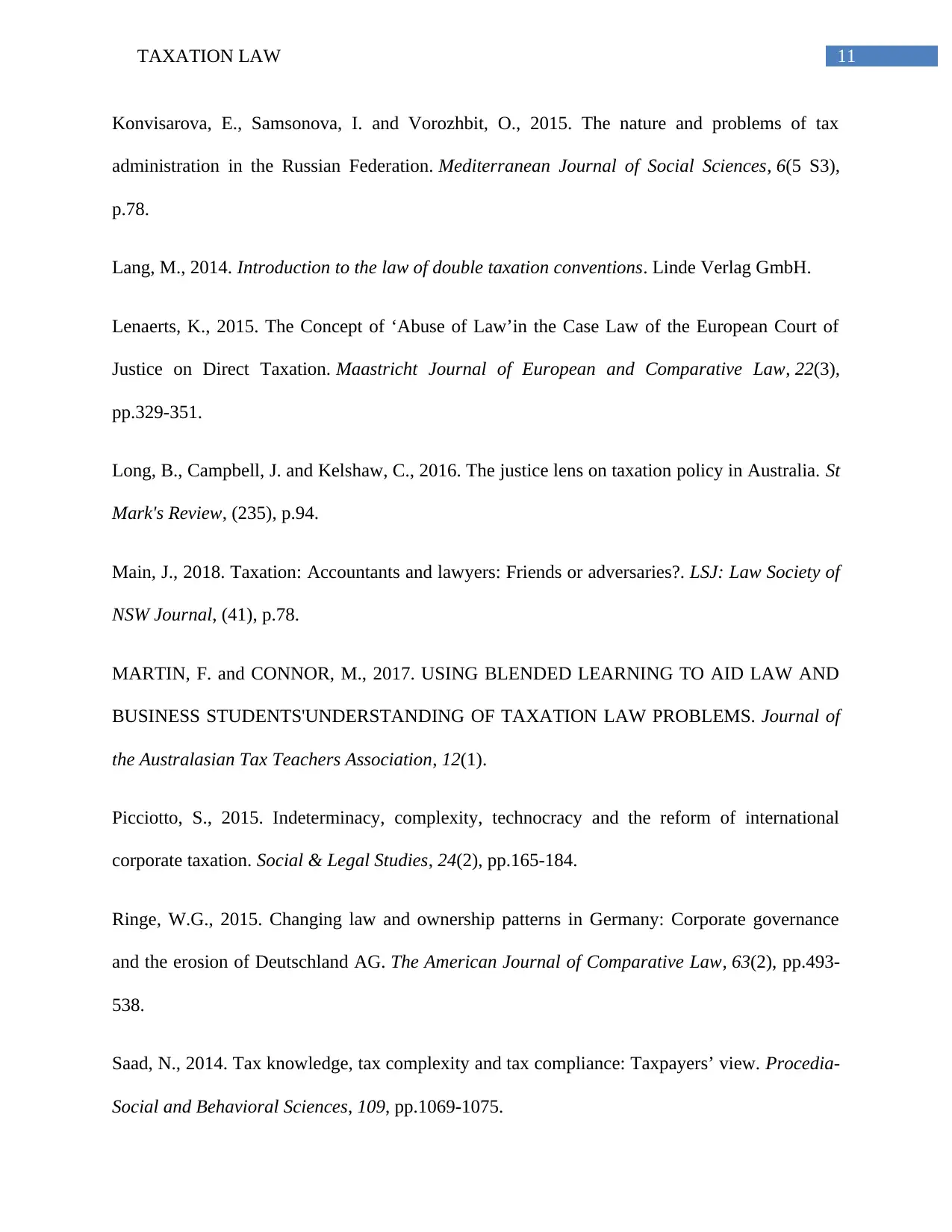
11TAXATION LAW
Konvisarova, E., Samsonova, I. and Vorozhbit, O., 2015. The nature and problems of tax
administration in the Russian Federation. Mediterranean Journal of Social Sciences, 6(5 S3),
p.78.
Lang, M., 2014. Introduction to the law of double taxation conventions. Linde Verlag GmbH.
Lenaerts, K., 2015. The Concept of ‘Abuse of Law’in the Case Law of the European Court of
Justice on Direct Taxation. Maastricht Journal of European and Comparative Law, 22(3),
pp.329-351.
Long, B., Campbell, J. and Kelshaw, C., 2016. The justice lens on taxation policy in Australia. St
Mark's Review, (235), p.94.
Main, J., 2018. Taxation: Accountants and lawyers: Friends or adversaries?. LSJ: Law Society of
NSW Journal, (41), p.78.
MARTIN, F. and CONNOR, M., 2017. USING BLENDED LEARNING TO AID LAW AND
BUSINESS STUDENTS'UNDERSTANDING OF TAXATION LAW PROBLEMS. Journal of
the Australasian Tax Teachers Association, 12(1).
Picciotto, S., 2015. Indeterminacy, complexity, technocracy and the reform of international
corporate taxation. Social & Legal Studies, 24(2), pp.165-184.
Ringe, W.G., 2015. Changing law and ownership patterns in Germany: Corporate governance
and the erosion of Deutschland AG. The American Journal of Comparative Law, 63(2), pp.493-
538.
Saad, N., 2014. Tax knowledge, tax complexity and tax compliance: Taxpayers’ view. Procedia-
Social and Behavioral Sciences, 109, pp.1069-1075.
Konvisarova, E., Samsonova, I. and Vorozhbit, O., 2015. The nature and problems of tax
administration in the Russian Federation. Mediterranean Journal of Social Sciences, 6(5 S3),
p.78.
Lang, M., 2014. Introduction to the law of double taxation conventions. Linde Verlag GmbH.
Lenaerts, K., 2015. The Concept of ‘Abuse of Law’in the Case Law of the European Court of
Justice on Direct Taxation. Maastricht Journal of European and Comparative Law, 22(3),
pp.329-351.
Long, B., Campbell, J. and Kelshaw, C., 2016. The justice lens on taxation policy in Australia. St
Mark's Review, (235), p.94.
Main, J., 2018. Taxation: Accountants and lawyers: Friends or adversaries?. LSJ: Law Society of
NSW Journal, (41), p.78.
MARTIN, F. and CONNOR, M., 2017. USING BLENDED LEARNING TO AID LAW AND
BUSINESS STUDENTS'UNDERSTANDING OF TAXATION LAW PROBLEMS. Journal of
the Australasian Tax Teachers Association, 12(1).
Picciotto, S., 2015. Indeterminacy, complexity, technocracy and the reform of international
corporate taxation. Social & Legal Studies, 24(2), pp.165-184.
Ringe, W.G., 2015. Changing law and ownership patterns in Germany: Corporate governance
and the erosion of Deutschland AG. The American Journal of Comparative Law, 63(2), pp.493-
538.
Saad, N., 2014. Tax knowledge, tax complexity and tax compliance: Taxpayers’ view. Procedia-
Social and Behavioral Sciences, 109, pp.1069-1075.
⊘ This is a preview!⊘
Do you want full access?
Subscribe today to unlock all pages.

Trusted by 1+ million students worldwide
1 out of 13
Related Documents
Your All-in-One AI-Powered Toolkit for Academic Success.
+13062052269
info@desklib.com
Available 24*7 on WhatsApp / Email
![[object Object]](/_next/static/media/star-bottom.7253800d.svg)
Unlock your academic potential
Copyright © 2020–2025 A2Z Services. All Rights Reserved. Developed and managed by ZUCOL.



